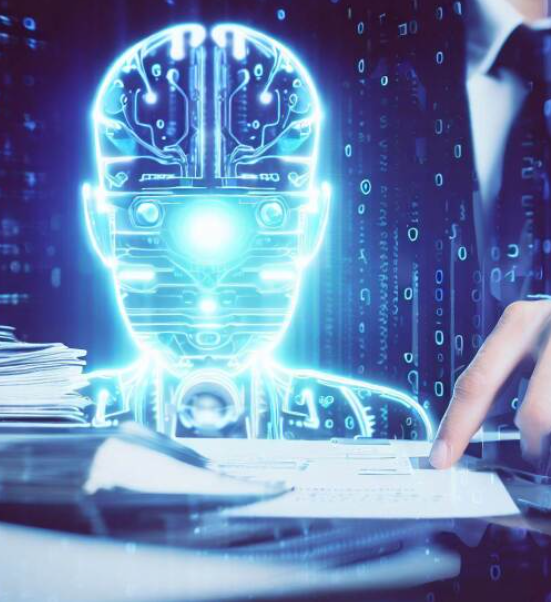How AI is Revolutionizing the Accounting Industry in 2024
- 361 Views
- admin
- 06/28/2025
- Artificial Intelligence
Artificial Intelligence (AI) is rapidly transforming the accounting profession, bringing innovative solutions that streamline operations, increase efficiency, and enhance decision-making. AI technologies are now a fundamental part of the business world, including the accounting sector, where they automate tasks, improve accuracy, and reduce human error. With AI playing an increasingly significant role in the industry, its potential to improve business processes is becoming clear.
How AI is Enhancing Accounting
AI has introduced several breakthroughs in accounting that are reshaping how professionals work. One of the most notable AI applications is machine learning (ML), which enables systems to learn from data, detect patterns, and make autonomous decisions. This technology is being used to automate complex accounting tasks such as managing accounts receivable, payable, and general ledgers. In addition, ML can spot inconsistencies in financial data, allowing businesses to detect fraud and irregularities early on.
For example, PayPal uses machine learning algorithms to detect fraud by analyzing transaction patterns. The algorithm identifies potential fraudulent activities, such as unfamiliar transactions or unusual spending habits, to reduce the risk of financial loss. This approach has helped PayPal maintain a remarkably low fraud rate.
Natural Language Processing (NLP) in Accounting
Another significant AI tool making waves in the accounting world is Natural Language Processing (NLP). NLP focuses on interpreting and understanding human language, allowing AI systems to process large amounts of textual data. In accounting, NLP is used to automate tasks like data entry, document analysis, and customer support.
For example, Bank of America has integrated a chatbot into its banking app, enabling customers to interact with the bank using voice and text commands. This tool provides a streamlined experience, helping users access functions quickly and efficiently. Additionally, AI can help accountants process invoices and financial documents. By automating these tasks, NLP reduces the time spent on manual data entry, allowing accountants to focus on more strategic tasks.
Generative AI for Efficiency and Personalization
Generative AI is another game-changer, offering businesses the ability to enhance operational efficiency. By analyzing vast amounts of transaction data, Generative AI can detect patterns and anomalies in real-time, which helps prevent fraud and improve customer personalization. It can also assist in product development by analyzing market trends and identifying customer preferences.
In finance, Generative AI is used to enhance credit scoring and underwriting, making the lending process more accurate and efficient. By analyzing diverse data sources, these AI models can predict an applicant’s creditworthiness more effectively than traditional methods.
Predictive Analytics for Better Decision Making
Predictive analytics is another AI tool that is transforming accounting practices. This technology uses historical data to predict future outcomes, helping businesses make more informed decisions. For instance, financial institutions use predictive analytics to forecast cash flows and anticipate changes in the financial landscape.
One example is PwC’s integration of predictive models into a financial institution’s budget forecasting system, which allowed the company to better anticipate cash flow and make more accurate budgetary decisions. These tools help businesses stay ahead of the curve, offering insights that are invaluable for future planning.
Robotic Process Automation (RPA) in Accounting
Robotic Process Automation (RPA) is a form of AI that automates repetitive tasks, allowing businesses to streamline their accounting processes. RPA can automate tasks like data entry, tax filing, and payroll calculations. This reduces the workload for accountants and ensures compliance with regulations while improving overall efficiency.
For example, Credigy, a multinational financial services company, used RPA to automate over 25 business activities, including document processing, email management, and IT audits. As a result, the company experienced an average yearly growth rate of more than 15%. This demonstrates how RPA can significantly enhance business operations.
The Benefits of AI in Accounting
The integration of AI into accounting offers numerous benefits, such as increased efficiency, reduced costs, and improved decision-making. AI allows businesses to automate mundane tasks, which saves time and reduces labor costs. By automating processes like invoice processing and data entry, businesses can focus on higher-value activities.
Moreover, AI minimizes human error, improving the accuracy of financial data. It also enables real-time data analysis, which helps accountants make more informed decisions and respond quickly to market changes. With AI, businesses can improve their financial forecasting, reduce operational risks, and enhance the overall customer experience.
Can AI Replace Accountants?
While AI is transforming accounting, it’s unlikely to replace human accountants entirely. Accounting requires human judgment, intuition, and expertise, especially when dealing with complex financial scenarios or interpreting regulations. AI can assist accountants by automating routine tasks, but it cannot replicate the strategic thinking, creativity, and decision-making abilities that human accountants bring to the table.
Accountants are still essential for tasks like interpreting financial data, providing advice, and ensuring regulatory compliance. AI can be used as a tool to enhance these capabilities, allowing accountants to focus on more complex and value-added activities, such as financial planning and advising clients.
Conclusion
AI is revolutionizing the accounting industry by automating tasks, improving accuracy, and enhancing decision-making. With the help of AI tools like machine learning, natural language processing, predictive analytics, and robotic process automation, accounting departments can operate more efficiently, reduce costs, and deliver better results. While AI cannot replace human accountants, it can undoubtedly supplement their work and help them focus on more strategic, higher-level tasks. As AI continues to evolve, its role in accounting will become even more integral, shaping the future of the profession.
Recent Posts
- How AI is Revolutionizing Architectural Design: A Look at Tools, Trends, and the Future
- Streamlining Cyber Risk Assessments Through Automation
- Understanding the Difference Between Blockchain and Distributed Ledger Technology
- Is Bitcoin Mining Still a Viable Venture in 2025?
- Exploring AI: Unveiling Possibilities, Challenges, and Future Implications

